- Home
- Jane Peart
The Promise
The Promise Read online
The Promise
3
Books by Jane Peart
The American Quilt Series
The Pattern
The Pledge
The Promise
The Westward Dreams Series
Runaway Heart
Promise of the Valley
Where Tomorrow Waits
A Distant Dawn
The Brides of Montclair Series
Valiant Bride
Ransomed Bride
Fortune’s Bride
Folly’s Bride
Yankee Bride/Rebel Bride
Gallant Bride
Shadow Bride
Destiny’s Bride
Jubilee Bride
Mirror Bride
Hero’s Bride
Senator’s Bride
American Quilt Series Bonus Section:
Dear Reader:
Once again, the editors and the author thank you for reading the American Quilt Series, and we would like to say what a joy it has been bringing these books to you. As this series now ends, we encourage you to read Jane Peart’s other fine books, including her monumental Brides of Montclair Series and her Westward Dreams Series. The Brides of Montclair Series is the epic twelve-volume story of a single Virginia family from before the American War of Independence right up to our own century. The Westward Dreams Series contains four books in all, each of which portrays an independent-minded woman from the east coast who travels to the Western territories of the nineteenth century to find a new life and eventually romance.
Our abiding wish is that all of these books will not only entertain you but edify you with their true-to-life settings and spiritual values. Thank you again.
Happy reading and happy quilting, The Editors of Zondervan Publishing House
The Promise
3
Jane Peart
The American Quilt Series
ZONDERVAN
The Promise
Copyright © by Jane Peart and Jane Peart
All rights reserved under International and Pan-American Copyright Conventions. By payment of the required fees, you have been granted the non-exclusive, non-transferable right to access and read the text of this e-book on-screen. No part of this text may be reproduced, transmitted, down-loaded, decompiled, reverse engineered, or stored in or introduced into any information storage and retrieval system, in any form or by any means, whether electronic or mechanical, now known or hereinafter invented, without the express written permission of Zondervan.
ePub Edition OCTOBER 2009 ISBN: 978-0-310-86552-0
Requests for information should be addressed to:
Grand Rapids, Michigan 49530
Zondervan_About-the-Publisher.pdf
A Division of HarperCollinsPublishers
* * *
Library of Congress Cataloging-in-Publication Data
Peart, Jane.
The promise / Jane Peart.
p. cm.—(The American quilt series; bk. 3)
ISBN: 0-310-20168-3
I. Title. II. Series: Peart, Jane. American quilt series ; bk. 3.
PS3566.E238P758 1996
813’.54-dc 20
94-17580
CIP
* * *
All Scripture quotations, unless otherwise indicated, are taken from the Holy Bible: New International Version?. NIV?. Copyright ? 1973, 1978, 1984 by International Bible Society. Used by permission of Zondervan Publishing House. All rights reserved.
Edited by Robin Schmitt
Interior design by Sherri Hoffman
Frontispiece illustration by Michael Ingle
Part title illustrations by Adam Bloom
96 97 98 99 00 01 02 /♦ DH/ 10 9 8 7 6 5 4 3 2
Table of Contents
Cover Page
Half Title Page
Other Books By
Dear Reader
Title Page
Copyright
Part One
Prologue
Chapter One
Chapter Two
Chapter Three
Chapter Four
Chapter Five
Chapter Six
Chapter Seven
Chapter Eight
Chapter Nine
Chapter Ten
Part Two
Chapter Eleven
Chapter Twelve
Chapter Thirteen
Chapter Fourteen
Chapter Fifteen
Chapter Sixteen
Chapter Seventeen
Part Three
Chapter Eighteen
Part Four
Chapter Nineteen
Chapter Twenty
Chapter Twenty-One
Chapter Twenty-Two
Chapter Twenty-Three
Chapter Twenty-Four
Chapter Twenty-Five
American Quilt Series Bonus Section:
Acknowledgments
About The Publisher
Consumer Engagement
Part One
Prologue
Jana Rutherford stood looking out from her window at the familiar scene she loved, one she never tired of viewing: beyond the rim of beach, the distant blue line of ocean. As she watched, along the horizon moved a single boat, its sails billowing against the orange-pink sky.
She would never forget her first sight of the Big Island. She had been ten years old and standing at the railing of the steamer coming from Oahu when her father declared, “There it is! Hawaii, the biggest of all the islands.”
She had looked in the direction he pointed. The Big Island seemed to emerge out of a sea of turquoise water. Lush green walls of dark tropical vegetation rose steeply above the scalloped beach, onto which the foam-edged surf swirled.
“That’s where we’re going to live, Jana. That’s our new home,” he had said. “We’re all going to be happy there.”
And they had been. Especially Jana. From the beginning, she had loved everything Hawaiian. She even liked her name better in Hawaiian. Koana. It sounded softer, more musical, than Jana or Johanna, her christened name.
A gentle wind rustled the fronds of the palm trees surrounding the house and stirred the curtains. Sighing, she reluctantly turned away, back to her bedroom. She still had much to do before tomorrow, when she would leave for Hilo, travel by steamer to Honolulu, and then board the ship that would take her to the United States.
Only one thing left to do, something she had left to the last. This task would seem in some way to tie up the loose ends of her life here in the house where she had lived for the last ten years.
She had to go through the contents of the rectangular koa wood box at the end of her bed. The chest had come with her from Oahu. It held her childhood, and the disposition of all the things stored within would have to be decided upon. It was a job she dreaded and so had procrastinated doing.
Kneeling in front of it, she raised the top. The collection of a lifetime was piled haphazardly within: old dolls long since put away; worn books; toys; a ragged, one-eyed plush bear, too scuffed and limp to be passed along to some other child, yet too beloved to part with; a cardboard portfolio she had fashioned to hold some of the first drawings and watercolors she had done at school; and in one corner, a battered shoe box. When she picked that up, a fine drift of sand spilled over her hands. Inside was an assortment of seashells. Immediately a whole parade of happy days on the beach swept through her mind. It was then that she saw what lay underneath, at the bottom of the chest: her memory book, a little warped, mildewed on the edges, its original pink cover turned brown, the spray of pansies that had been painted diagonally across it, faded.
Taking the book out, Jana sat back on her heels and placed it on her lap. Slowly she opened it and read the first yellowed page.
THIS MEMORY
BOOK BELONGS TO JOHANNA RUTHERFORD
born on Oahu in the Hawaiian Islands, on the occasion of her twelfth birthday, given to her by her loving Grandmother, whose fondest wish is that these pages may only record sunny hours, noble thoughts, joy-filled days, and happy memories.
Johanna Shelby Davison
November 1881
My grandmother, who lives in North Carolina on the mainland, sent me this book. In it I am going to write all the important things that happen in my life. Then when I am old, I can look back and remember what it was like to be a child. Grown-ups seem to forget.
Some important things have happened to me this year. First, I have a baby brother, Nathan. Alani, his nurse (she used to be mine), mostly calls him Nakana or keiki, which means “baby” in Hawaiian. He was such a surprise. When my mother arrived from Honolulu, she was carrying him. He is the most beautiful thing I’ve ever seen. Like a little doll, with plump rosy cheeks, a little button of a nose, and a tiny round head covered with soft golden hair.
I had another brother, born in California where Mama and Papa lived before they came to the islands. But he died of scarlet fever when he was only a few months old. Mama says he’s a little angel in Heaven now. That’s why Mama was so happy to have me after they came to Oahu. And now we have another little boy for our family. Isn’t God good?
The second important thing is that we moved to the Big Island. My father, Wesley Rutherford, is now principal of a school in Waimea. My father and I came here first. We came by ship and landed in Hilo, then rode in a wagon over to the home of Mr. Caldwell, the superintendent of island schools, where I am to stay until Mama and the new baby come with all our household things.
The next important thing that happened to me: I met Akela and Kimo. They are cousins. They live with their tutu—that’s the Hawaiian name for grandmother. She was in Kohala, at the other end of the island, so they were boarding there, too. I mention this because Akela is now my best friend.
Akela will be in my class when school starts. She is very pretty and very sweet. Kimo is twelve, and two years ahead of us. At first I didn’t like him at all. He seemed kind of stuck up. Later I found out they belong to the Kanakui family, known by Hawaiians as the alli. They are considered nobility, because they are descended from the ancient chiefs of the islands. I did not know this until Kimo informed me.
Summer 1882
Akela, Kimo, and I go to the beach together most every day. Kimo likes to be the leader in our games. We climb on the banyan trees, build sand forts, and look for shells in the tide pools. We swim in the shallow water. Kimo has a board on which he paddles out beyond the breakers, then catches a wave and rides it in. He showed me how to do it, too. But I kept falling off. I wish I could go barefoot all the time.
September 1882
Summer is over. I hate for it to end. I love being free of lessons and homework, and only going to the beach all day. School started today. Edith Preston, the daughter of Colonel Preston of the big Preston Ranch, enrolled this year. She was put in our class, since she is the same age as us. She has been tutored at home until now. Her father wants her to go to regular school and have friends on the island. She has dark eyes but golden blond hair, because she is a hapa-haole. Her mother was a Hawaiian princess, Akela’s tutu told us. Akela and I haven’t decided yet if she will be our friend.
September 25th
We’ve decided to be friends with Edith Preston. Her Hawaiian name is Ekika, which we have shortened to Kiki. That’s what we call her. She is fun and friendly. I think we’re going to like her, even if she is very rich. We have formed a friendship club: Akela and Edith and me.
October 1882
Kimo is an awful tease. Sometimes I hate him! He does this really maddening thing—he’ll pull the ribbon out of my hair and hold it out of my reach while I try to snatch it back. Then he’ll recite a terrible singsong: “Johanna, banana, tee-legged, toe-legged, bow-legged Johanna!” I don’t know where he got it, but it makes me really angry.
Tutu Kipola says not to pay any attention to him. “He’s just trying out being a man.” We had so much fun all summer. Kimo went with us most of the time. At school he hardly speaks to us. He stays with the boys. It isn’t mana to talk to girls there except to tease.
December 1882
Akela and I went up to the Preston Ranch the day after Christmas. Edith showed us all the things she got for Christmas. I never saw so many presents for one person. Edith’s big brother, Bayard, is home for Christmas from the school on the mainland. He never paid any attention to us at all till he heard me call Edith by her Hawaiian name, Kiki. Then he yelled at me. He is so stuck up and bossy. Anyway, we got to ride horses and have fun.
September 1884
I haven’t written in here for a long time, because nothing important has happened. This is very important. Kimo is to go to a boarding school in Honolulu, to the Hawaiian Heritage Academy. The fees were provided by a trust fund set up by a wealthy Hawaiian, for pureblooded Hawaiians only. Akela cannot attend, she told me, because her father was Chinese. Even though I hated Kimo’s teasing, I know I shall miss him.
January 1885
Kimo came home for the Christmas holidays. He has grown a lot. At first we were shy with each other, because it seemed he had been gone such a long time. But after a while it was all right. We will always be friends, I think. At least, I hope so.
Summer 1885
I haven’t written all summer. I’ve been too busy. So much has happened. Kimo was back on the island from school. He is helping his uncle in his carpentry shop in Kona during the week, and he’s only at Tutu’s on the weekends. He graduates from Heritage Academy next year and has applied for an apprenticeship to a famous cabinetmaker in Germany! If he gets it, he will be gone two years!
September 1885
Kimo left for Oahu today. He came to see me last evening to say good-bye. He gave me a beautiful koa wood jewelry box he’d made. He said it was for my birthday, since he won’t be here when I turn sixteen. We walked down to the beach together. Kimo wrote in the sand, Kua kau makamaka. In Hawaiian that means, “Forever friends.”
The rest of the pages of the memory book were blank. Idly Jana turned them. So much had happened since that last entry. And it all seemed so long ago. Nearly four years…
When had she stopped writing in this book? More to the point, why? Could it be because of her grandmother’s wish that only “sunny hours, joy-filled days, and happy memories” be recorded here?
Jana sighed and slowly closed the book. She held it for a minute against her breast, then thoughtfully replaced it and closed the koa box lid.
Was it the Christmas of 1885 when everything had changed for her?
Chapter One
The Big Island of Hawaii Early December 1885
I have something so exciting to tell you two!” declared Edith Preston as she, Jana, and Akela left school one afternoon the first week in December. “I’ve been dying to tell you.”
“What is it, Kiki?” Jana asked, using her friend’s Hawaiian name. “Do tell. I love secrets.”
“Well, it’s not exactly a secret, but I had to wait until everything was arranged. Bayard is bringing home some friends for the Christmas holidays. Papa says I am to invite you both to come stay over New Year’s. It will be a real house party, the kind Papa and Mama used to have in the old days. Papa says he wants to have the house filled with young people, music. There will be a ball and a rodeo. It will be ever so fun.”
Jana looked at Edith. Even in her school uniform of shirtwaist and khaki skirt, she was strikingly beautiful. The combination of golden hair, tawny skin, and dark-brown eyes revealed her mixed heritage. Her mother had been a Hawaiian princess, and her father was the owner of the largest ranch on the island.
“So you will come, won’t you?” Edith demanded. She halted, her hands on her slim hips, facing her friends.
“I don’t know,” Jana replied uncertainly. She wasn’t at all sure if her parents would allow he
r to attend such a house party. It might sound too sophisticated.
Bayard Preston, Edith’s half brother, was a student at Yale on the mainland. His classmates, the guests he was bringing home, would all be his age, sophisticated college men. Details of Colonel Preston’s lavish parties, which were attended by wealthy friends from Honolulu and as far away as San Francisco, fed the gossip mills of Waimea. The Prestons moved in a social world unknown to the conservative Rutherfords.
Although her parents had never done anything to discourage the girls’ friendship, Jana’s father, Wesley, was the exact opposite of the flamboyant Colonel Preston. She knew that her father disapproved of some of Colonel Preston’s projects. His buying up of land and developing it the way he did was one example. Her father often expressed his concern that the very things that seemed to expand the economy also destroyed some of the old ways, the customs of the Hawaiian people. He believed that as more people went to work at the Preston Ranch and other such enterprises, fewer maintained their own small farms and businesses and remained independent.
Her mother’s objections would be more personal. She regularly cautioned Jana not to be too impressed by what was taken for granted at the ranch. “Money can’t buy happiness, you know.” That statement totally bewildered young Jana. Edith, Bayard, and Colonel Preston seemed perfectly happy to her.
These thoughts passed quickly through Jana’s mind. Edith looked indignant at her hesitation. She stared at Jana wide-eyed. “Of course you’re coming! It’s going to be marvelous. Why ever wouldn’t you come?”

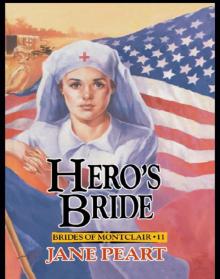 Hero's Bride
Hero's Bride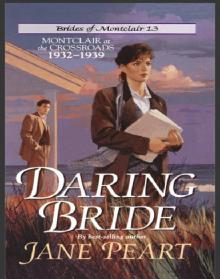 Daring Bride
Daring Bride Runaway Heart
Runaway Heart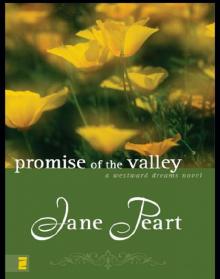 Promise of the Valley
Promise of the Valley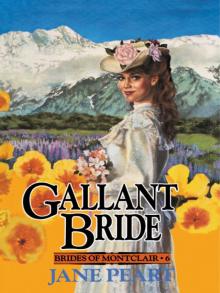 Gallant Bride
Gallant Bride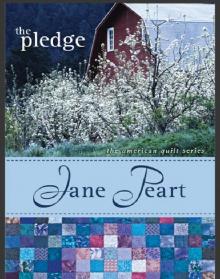 The Pledge, Value
The Pledge, Value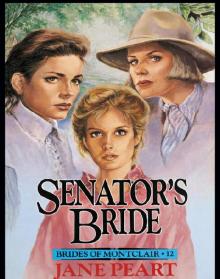 Senator's Bride
Senator's Bride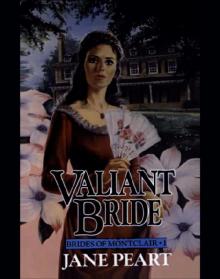 Valiant Bride
Valiant Bride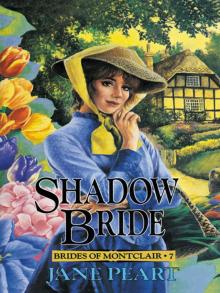 Shadow Bride
Shadow Bride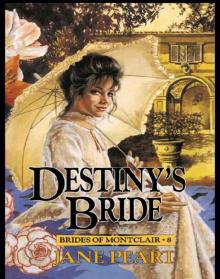 Destiny's Bride
Destiny's Bride A Tangled Web
A Tangled Web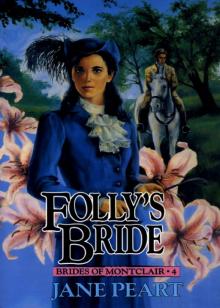 Folly's Bride
Folly's Bride The Promise
The Promise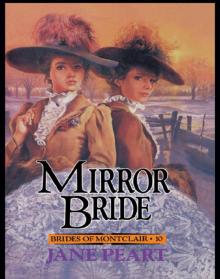 Mirror Bride
Mirror Bride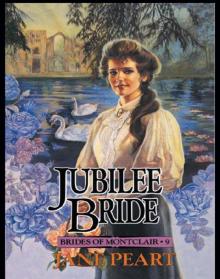 Jubilee Bride
Jubilee Bride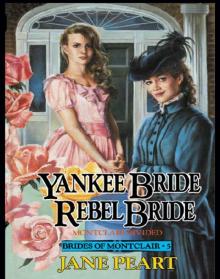 Yankee Bride / Rebel Bride
Yankee Bride / Rebel Bride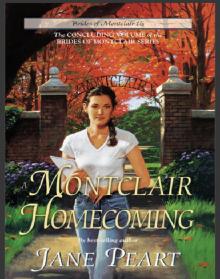 A Montclair Homecoming
A Montclair Homecoming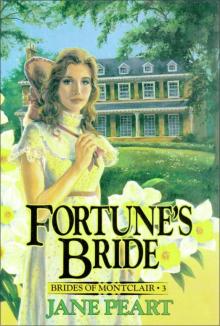 Fortune's Bride
Fortune's Bride Undaunted Spirit
Undaunted Spirit Love Takes Flight
Love Takes Flight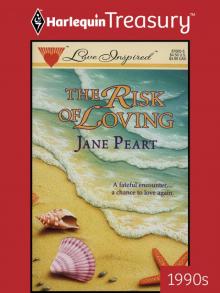 The Risk of Loving
The Risk of Loving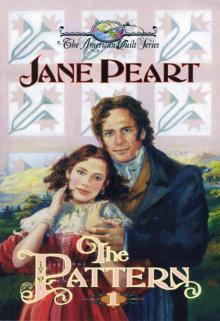 The Pattern
The Pattern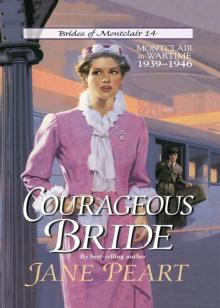 Courageous Bride
Courageous Bride